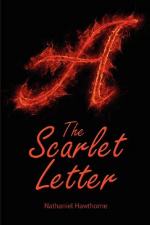“There goes a woman,” resumed Roger Chillingworth, after a pause, “who, be her demerits what they may, hath none of that mystery of hidden sinfulness which you deem so grievous to be borne. Is Hester Prynne the less miserable, think you, for that scarlet letter on her breast?”
“I do verily believe it,” answered the clergyman. “Nevertheless, I cannot answer for her. There was a look of pain in her face which I would gladly have been spared the sight of. But still, methinks, it must needs be better for the sufferer to be free to show his pain, as this poor woman Hester is, than to cover it up in his heart.”
There was another pause, and the physician began anew to examine and arrange the plants which he had gathered.
“You inquired of me, a little time agone,” said he, at length, “my judgment as touching your health.”
“I did,” answered the clergyman, “and would gladly learn it. Speak frankly, I pray you, be it for life or death.”
“Freely then, and plainly,” said the physician, still busy with his plants, but keeping a wary eye on Mr. Dimmesdale, “the disorder is a strange one; not so much in itself nor as outwardly manifested,—in so far, at least as the symptoms have been laid open to my observation. Looking daily at you, my good sir, and watching the tokens of your aspect now for months gone by, I should deem you a man sore sick, it may be, yet not so sick but that an instructed and watchful physician might well hope to cure you. But I know not what to say, the disease is what I seem to know, yet know it not.”
“You speak in riddles, learned sir,” said the pale minister, glancing aside out of the window.
“Then, to speak more plainly,” continued the physician, “and I crave pardon, sir, should it seem to require pardon, for this needful plainness of my speech. Let me ask as your friend, as one having charge, under Providence, of your life and physical well being, hath all the operations of this disorder been fairly laid open and recounted to me?”
“How can you question it?” asked the minister. “Surely it were child’s play to call in a physician and then hide the sore!”
“You would tell me, then, that I know all?” said Roger Chillingworth, deliberately, and fixing an eye, bright with intense and concentrated intelligence, on the minister’s face. “Be it so! But again! He to whom only the outward and physical evil is laid open, knoweth, oftentimes, but half the evil which he is called upon to cure. A bodily disease, which we look upon as whole and entire within itself, may, after all, be but a symptom of some ailment in the spiritual part. Your pardon once again, good sir, if my speech give the shadow of offence. You, sir, of all men whom I have known, are he whose body is the closest conjoined, and imbued, and identified, so to speak, with the spirit whereof it is the instrument.”
“Then I need ask no further,” said the clergyman, somewhat hastily rising from his chair. “You deal not, I take it, in medicine for the soul!”




